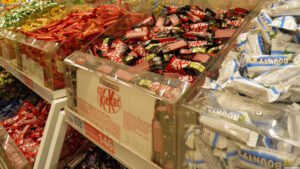
The lack of production facilities in Ukraine and the import of its confectionery products into the country allows Mars Corporation to successfully conduct its business amid a crisis in the industry caused by the rise in prices for raw materials and energy resources, Chief Financial Officer (CFO) of Mars Ukraine LLC (Brovary, Kyiv region) Svitlana Hrukhal has said. “In the field of confectionery, we have everything under control. We import products, and this makes it possible to distribute the raw material base and production resources in several countries and thus compensate [for crises],” she told Interfax-Ukraine on the sidelines of the Ukrainian CFO Forum on Wednesday.
According to her, the key trend in the industry is the growth in demand in Ukraine and neighboring countries, which is most pronounced in the segment of chocolate and chewing gum. Hrukhal said that in order to meet this demand, it is necessary to increase production of confectionery products in the region, which is hindered by the rise in prices for raw materials, their shortage, as well as the lack of labor resources.
“If we talk about assessing the development of confectionery products specifically for Mars Corporation, then we have everything under control, and we hope to successfully close this year,” the company’s CFO said.
During the forum, she also said that in 2007 the company planned to build a plant in Boryspil district (Kyiv region) for production of animal feed, but due to unstable business conditions in Ukraine, it abandoned this idea. According to her, for large international companies, the presence of clear and understandable “rules of the game” in the country is a more important factor for investment than well-developed measures of state support for business.
Mars Ukraine LLC is a Ukrainian division of the large international confectionery company Mars. The company sells food and pet care products in Ukraine, produced in Russia and Hungary. Its major brands are Snickers, MARS, Twix, Bounty, Milky Way, M&M’s, Maltesers, Dove, Pedigree, Chappi, Whiskas, Kitekat, Sheba and others.

From the beginning of 2021, confectionery products in Ukraine has risen in price by 15% to 20% due to the rise in sugar prices caused by the cartel agreement of its producers and the lack of supply of this product on the domestic market, Head of the Association of producers of confectionery, food concentrates, starch products and coffee in Ukraine (Ukrkondprom) Oleksandr Baldyniuk said during press conferences at Interfax-Ukraine on Thursday.
“In our industry, the rise in sugar prices has led to quite severe economic consequences, which forced us from the beginning of the year to increase the cost of our products by 15% to 20%. We got a situation when the industry reduced production by 25,000 to 26,000 tonnes, or UAH 1.3 billion in monetary terms,” he said.
Baldyniuk said the consequence of the reduction in production was an increase in imports of confectionery products to Ukraine by 20%. The industry also loses out in export positions in the EU, CIS and Central Asia markets. The high price of sugar has led to a situation where the production of caramel in some EU countries is more profitable than in Ukraine.
According to him, over the past 11 months, Ukrainian processing enterprises receive sugar at prices 30% to 40% higher than in Europe, in particular, on the London Stock Exchange over the past month, sugar fell from $459 per tonne to $432 per tonne, while in Ukraine it rose in price from $660 per tonne to $781 per tonne.
The head of Ukrkondprom said that too expensive sugar in Ukraine leads to the fact that Ukrainian producers lose their competitiveness in the domestic and export markets, forcing the industry’s enterprises to cut production and lay off employees.
Baldyniuk said that the crisis situation in the confectionery industry has developed due to the cartel conspiracy of sugar producers and the shortage of its supply on the domestic market.
“Since today the Antimonopoly Committee of Ukraine has initiated a case and is investigating a cartel agreement, we can conclude that it has reason to assume a cartel agreement,” the head of the association said.
According to him, the supply of sugar in Ukraine after the sugar-making season, together with the transition residues from last year, is 1.2 million tonnes with its internal consumption at the level of 1.5 million tonnes. Even taking into account the import of 40,000 tonnes of white sugar from Europe within the existing quota, as well as the import of raw sugar, the deficit of this product is still 60,000 to 70,000 tonnes.
Baldyniuk said the way out of this situation is the adoption by the MPs of bill No. 5673 on the establishment of a tariff quota for the import of white sugar into Ukraine. According to him, a temporary permit for duty-free import of 60,000 tonnes of sugar from the EU will balance supply and demand for it in the country, while not creating losses for the sugar industry.